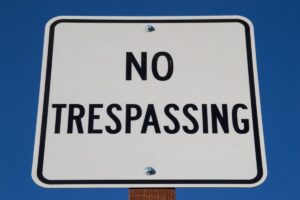Breaking and Entering Can Be The Basis of Trespassing or Burglary Charges
If you look for a crime in Colorado called “breaking and entering,” you won’t find one. But the act is most definitely a criminal offense. The activities typically involved with this crime – using force to gain unauthorized entry onto someone else’s property – are either trespassing or burglary. While the former involves simply being on another’s property without their permission, the latter involves doing so with the intent to commit another crime, such as theft, vandalism, or arson.
A burglary conviction in Colorado comes with severe penalties, including prison time.
Breaking and Entering and Trespassing
 The crime of criminal trespass in Colorado involves unlawfully entering or remaining in or upon the premises of another. There are three
The crime of criminal trespass in Colorado involves unlawfully entering or remaining in or upon the premises of another. There are three
degrees of criminal trespass, with the most severe offense being unlawful entry into a residential dwelling (as opposed to an office building or retail store).
Whether breaking and entering will result in trespass or burglary charges depends on why the person used force to gain access to the property. If someone breaks into and enters a building or other property with no intent to commit a crime, that is not burglary, though it could be trespassing.
For example, if a homeless person broke into a school to get out of freezing temperatures during a winter storm but had no intent to and did not do anything beyond keep warm, that would be trespassing at most, even though it involved “breaking and entering.”
Criminal trespass can be a petty offense, misdemeanor, or felony, depending on the type of property at issue. The most serious charges relate to trespassing in an occupied dwelling or someone’s motor vehicle with intent to commit a crime. Such charges are a class 6 felony, punishable by up to 18 months in prison, mandatory parole, and fines between $1,000 and $100,000.
Breaking and Entering and Burglary
When someone breaks into and enters a property or a building intending to commit another crime, it s no longer mere trespassing. The act becomes burglary, which is a much more serious offense.
Burglary is what most people picture when referring to breaking and entering – someone in a mask and dressed in black breaking a window, picking a lock, or otherwise using force to gain access to a home, property, or business to steal items.
But you can also face burglary charges for breaking and entering onto someone else’s property with the intent to commit any crime (vandalism, assault, arson, etc.) even if you had no intention of stealing anything. Importantly, you don’t have to commit the other offense to face burglary charges – all that matters is your intent.
A burglary charge can be a misdemeanor or felony, depending on the circumstances. For instance, the type of property involved, the crime intended, whether others were present and whether the alleged perpetrator made threats or assaults against others.
And, like trespassing offenses, burglaries that occur in residential dwellings (as opposed to businesses) can lead to more severe penalties, as can those involving the theft of controlled substances.
Related: Burglary Charges vs. Robbery vs. Theft – What You Need to Know About Your Charges
There are three degrees of burglary charges in Colorado:
Third-Degree Burglary
A class 5 felony with the potential for one to three years in prison, third-degree burglary involves entering or breaking into a safe, vault, cash register, coin vending machine, product dispenser, safety deposit box, money depository, coin box, coin telephone, or other apparatus intending to commit a crime.
Second-Degree Burglary
Second-degree burglary is usually a class 4 felony that consists of knowingly breaking into or unlawfully remaining in a building or occupied structure intending to commit a crime. A conviction could result in a prison sentence of two to six years.
First-Degree Burglary
First-degree burglary is the most serious burglary charge under Colorado law and comes with a potential four to 12-year prison sentence.
This class 3 felony includes the same elements as second-degree burglary. However, if the crime includes assaulting or menacing any person inside the building or structure while entering or fleeing or involves the use of a deadly weapon, the alleged perpetrator will be charged with first-degree burglary and the more severe consequences.
Breaking and Entering Charges Are Serious. Don’t Face Them Alone.
Whether you are facing criminal trespassing or burglary charges, the consequences of breaking and entering can be long-lasting and severe. Don’t make the mistake of trying to defend yourself against the charges on your own or with an inexperienced defense attorney.
The Colorado Springs criminal defense lawyers at James Newby Law use their experience and insight as former El Paso County prosecutors to defend the rights of individuals facing burglary and criminal trespassing charges.
